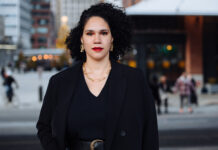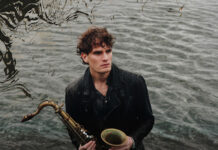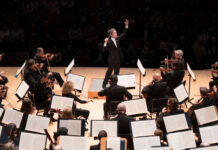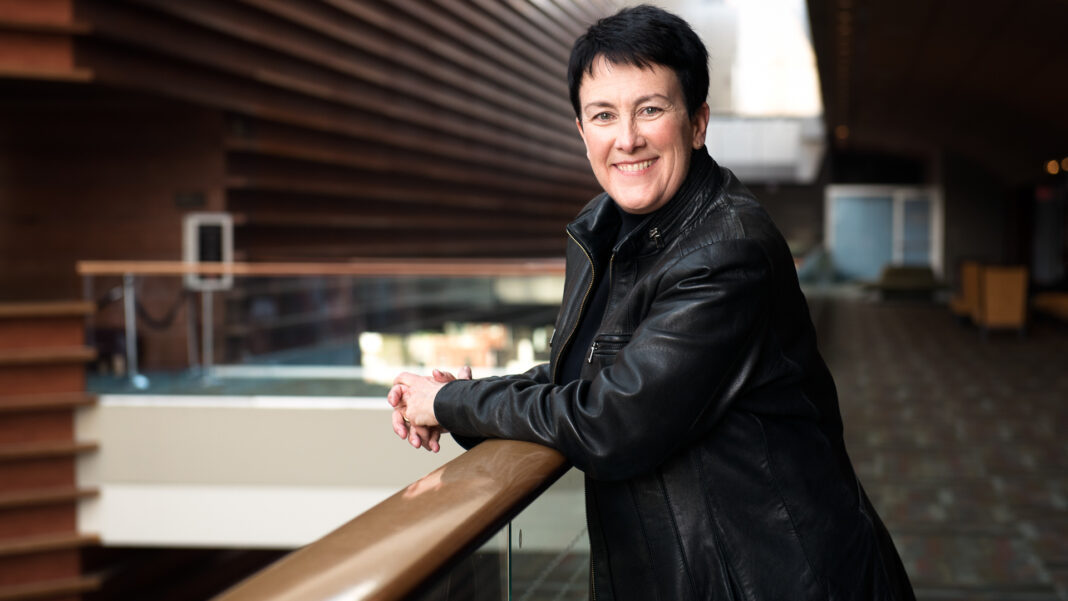Vivaldi has The Four Seasons. Gustav Holst has The Planets. Not to be outdone, violinist Joshua Bell commissioned The Elements which brought together five composers to write movements inspired by Earth, Water, Fire, Air and Space for violin and orchestra. Those composers were Kevin Puts, Edgar Meyer, Jake Heggie, Jennifer Higdon and Jessie Montgomery (in order to match the movement they composed).
The Elements had its world premiere on September 1st with the NDR Elbphilharmonie Orchestra with Alan Gilbert conducting. The US premiere took place in late September and early October with the New York Philharmonic. More performances are being scheduled and on October 25th Bell will perform three movements with the Atlanta Symphony Orchestra.
Higdon is one of the most acclaimed composers of her generation. She received the Pulitzer Prize for Music in 2010 for her violin concerto. She is the recipient of three Grammy Awards and her opera, Cold Mountain, had its world premiere in 2016 at Santa Fe Opera.
Higdon didn’t get to choose her movement. She took Air as her movement and thought quickly and decisively about the role her movement would play in Bell’s commission.
In this conversation she talks about her approach to Air, thinking about Joshua Bell as the soloist and the role of air in her daily life. What follows are excerpts from our conversation that have been edited for length and clarity. To see the full interview, please go to our YouTube channel.
Q: Joshua Bell had the idea of the elements and then adding space as a fifth component. But was it a lottery? How did you each composer get the element that you ended up writing?
When Joshua called me he said, “Well, the elements have all been picked, so the only thing left is air.” And I said, okay, I’ll do air. At that point there were only four composers – we didn’t have space as part of it. At some point he decided he wanted space to be a part of the equation and they asked Jessie Montgomery. So I think the guys all picked the elements they wanted. Then they called me.
If it had all been open and you could have chosen any one of the five, which one do you think you would have chosen?
Well, I think I could have come up with stuff for all of them. There was something interesting about air, though, because I’m a former flute player, so there was something striking about it and I might have picked that.
I would say that if I were writing one of the other movements, it would be very different than what I wrote. Because to me the different elements feel like musically they would need to have different character just in the materials, the way it’s handled, the speed and the tempo. There are a lot of ways to go, but I think every composer approaches this according to their inner gyroscope.
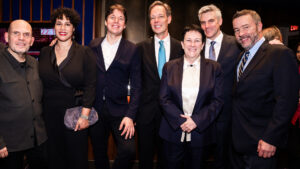
You weren’t dealing with air as wind. You were dealing with it as what we take in, what we breathe, what we need, what the planet needs. How did you go from conceiving the work as being about that component of air to what you actually put on paper?
I thought strategically, because I’ve written a lot for violin. My colleagues, I figured, would be excited to write some really virtuosic stuff for Joshua, which he plays fantastic. I thought to myself, what would the audience need to hold them through a long concerto? I love Joshua’s playing. His tone is beautiful in the lyrical lines he plays in all of the concertos and the solo stuff he does.
Maybe I should go and emphasize that and just make a quiet spot so the audience can breathe. I was thinking about the breathing thing. This is a much calmer sort of experience. It’s also a challenge for me because normally I write a lot of fast notes.
For somebody who writes a lot of notes, how much does stillness, how much does silence, play a role in your concept of air?
Actually quite a bit – especially in this. I used many more wind and brass voicings and less strings, partly to set off Joshua’s violin voice, but also just because they use air. I do put pauses in there. I make everything move slowly.
I was thinking a lot about the seasons. One of the things that strikes me is when seasonal changes come, the first thing we usually notice is the air when we step outside. The spring smells very different than the fall and winter. The bite of winter feels very different than the summer humidity that we often get on the East Coast. Part of it was just thinking about the distinctiveness of the air.
But I also thought about the fact that the word air is often used as a musical term meaning song, aria. The word aria came out of air, so that made for me a different kind of challenge than most people have. They have trouble filling things up. My goal is backing off and calming down. So I thought this would be a good way to do this.
How does a work like The Elements come together given that five different composers are writing individual movements for it?
That’s the one thing about this concerto that’s fascinating. Every sound world is different because it’s a different composer. So you’re getting real variety in what you’re hearing. It makes the musical experience different than if you were listening to just a 40-minute concerto from one composer. The language is changing, the pacing, the rhythm, the interchange between the orchestra and the soloist. Actually it’s very, very effective.
Is cohesion an outdated idea for contemporary works?
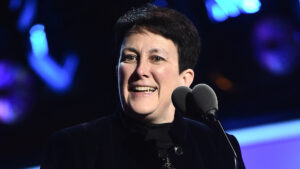
I think artists can’t really say anything is outdated. I think everything’s on the board. I like the idea of variety. We can have both. We could have cohesion within our own little movements.
One thing that gives Joshua a chance to do, if he does another piece with another orchestra and he wants to do one of these movements, he can do that. He can just pull it because the things work as self-contained units. They could also combine like maybe two or three of them if he needs a medium size work.
[As is the case with Bell’s October 25th concert with the Atlanta Symphony Orchestra where he will perform the Bruch Violin Concerto and three movements from “The Elements.”]
In an interview that you gave to Annelena Lobb for the Wall Street Journal in 2005, she asked what you did to relax. After answering that you walked and went to the movies a lot, she said, “So it’s not music all the time?” And your response was, “I think that would be hard. The brain needs to breathe.” It seems as though, even 18 years ago, you were considering breath and air as part of your need to be healthy.
My answer is still I take breaks. I compose about 6 hours a day, I have to take breaks. Our brain really does need to break because sometimes it has to solve the musical problems you’re wrestling with. If I go too long without walking, I get cranky in the same way that I get cranky if I go too long without composing. I’m really bad about taking the breaks, but I’ve learned through the years to make sure I do it because it actually helps the music.
What is the conversation that you would like to see amongst contemporary composers that maybe is a different conversation than the one that happens when contemporary works are sandwiched with the works by composers from anywhere from 100 or more years ago?
I’m not sure how to answer that because I’m always on with older works. One of the things I have noticed when I attend concerts [is] the concerts that seem to be drawing more people are the ones that have some contemporary music on it. I’m not sure what shifted during the pandemic, but something did, and I can tell from quite a few of the concerts I have been to have been sold out. A lot of times I see orchestras just doing the same pieces over and over again, the audiences are shrinking.
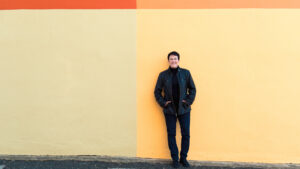
One of the things I encounter a lot is the number of people who come up to me and say, “Oh my God, I’m so glad to see a woman on the program.” I didn’t realize how much it meant to other people. I just am writing the music. But other people take it as my voice is heard from the orchestral stage. I think that’s more important than a lot of people may realize because it makes it more relevant in the community.
I always think of using music now to pull people in to hear an event or something that’s unusual and then program something else on that you really like. I fear that the audience is going to drop off too much. I think LA [Philharmonic] is doing an amazing job balancing that. It may be the orchestra that’s doing it probably better than anyone else.
You works get performed a lot around the world. You’re right up there with Phillip Glass and John Adams. Let’s say you’re in rarified air.
I’m lucky. I have like 250 performances a year, so I get pieces that are just repeated much more than Mozart or Beethoven ever heard in their lifetime. That’s actually an incredible, miraculous thing when I think about it.
I think that more people will get more performances if artistic administrators were looking around, were aware of more composers coming up. It’s ironic. I’m talking to you in L.A. The L.A. Phil is literally the last major orchestra in the United States who has not done my music. I think I’ve worked probably with 700 or 800 orchestras around the world. But the L.A. Phil is literally the only one that I’ve not had a performance with and I get asked about that now all the time. It’s unusual because [1999’s] Blue Cathedral, we’ve had 800 orchestras do that piece and even that hasn’t been in L.A. I’m sure it’ll get corrected in the next couple of years.
Edith Wharton is quoted as having said, “The air of ideas is the only air worth breathing.” How does the air of ideas inspire you as you move forward throughout your career?
It seems to me like anyone who is creative just lives in the era of ideas. Although I do know a lot of composers who struggle. If you’re able to actually write every day that tends to make the air produce more ideas. But I think you have to always be thinking. A lot of times people only get to work some small amount of time on a job. I think it’s hard to kind of air out the laundry and and get fresh ideas in what you’re doing. So it’s interesting. I know that’s a really good question. Isn’t that applicable to anyone doing anything creative, though?
Without that air and without those ideas, we’re stuck.
We’d be dead. It would not be an interesting world. Even the kids would come up with some cool idea of how to skateboard in a different way or something that’s also living in the air of ideas. That’s literally having your ideas fly through the air. But let’s look at the Wright brothers. Those are radical ideas. Same for astronauts and NASA. But I also realize that someone is cleaning a floor somewhere and they’re going, you know, there’s probably a better way to do this. The idea of raising kids, it takes constant creativity, always thinking. So I guess that quote is factual and is applicable to every human being that crosses this planet.
To see the full interview with Jennifer Higdon, please go here.
To learn more about The Elements, please go here.
Main Photo: Jennifer Higdon (Courtesy JenniferHigdon.com)


